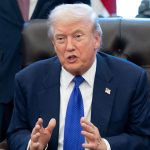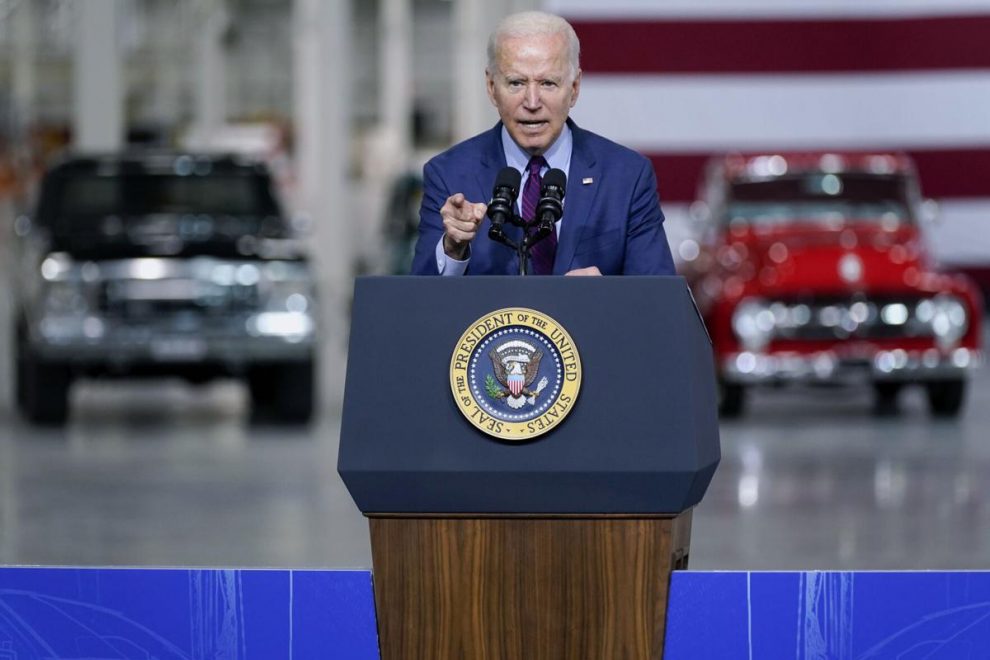President Joe Biden, while touting his $174 billion electric vehicle (EV) plan, ignored his record of allowing Chinese investors with ties to the Chinese Communist Party to buy up key parts of the American EV industry.
During a speech at the Ford Rouge Electric Vehicle Center in Dearborn, Michigan, Biden touted his record as vice president to former President Barack Obama in relation to the nation’s battery-powered EVs.
“Our own Department of Energy pioneered and transformed the battery industry when Barack and I were in office. And through the Recovery Act’s grants and loans, battery prices dropped 80 percent because we were looking forward,” Biden said.
Biden also said he would not allow “a single contract go to a single company that does not hire Americans, have all American parts, and has an American supply chain that is an American product supply chain.”
Unmentioned in the speech, though, was Biden’s record of allowing Chinese investors with Chinese Communist Party ties to acquire American companies with EV technology capabilities.
Detailed analysis by Breitbart News Senior Editor-at-Large Rebecca Mansour showed extensively how the Obama-Biden administration had let China buy up this critical industry in the United States market from 2009 to 2016:
The biggest winner in this push for an all-electric future is China, which is eager for the transition to EV because the communist regime does not have the same access to plentiful oil and gas as American consumers. In fact, the Chinese Communist Party has made dominance of the EV industry a key goal in its ambitious China 2025 initiative, hoping to overtake Detroit as the world’s automotive capital.
Indeed, China is positioning itself to do just that. Companies like Ford and General Motors have partnered with Chinese state-owned companies to develop and manufacture new electric vehicles in Asia. Ford has 16 new electric models coming out of China in the next few years, and GM intends to launch 20 electric models in China by 2023.
To be fair, the entire worldwide auto industry seems eager for an all-electric future. Nearly all of the world’s auto manufacturers are investing heavily in EV. There’s a reason for this, and it has less to do with the environment and more to do with the industry’s bottom line.
When you eliminate the internal combustion engine, you eliminate hundreds of components that comprise it. This will dramatically change the landscape of the automotive industry for millions of parts suppliers, engineers, mechanics, and countless blue-collar workers. That’s because the average electric vehicle deletes over 300 components. The fuel-powered vehicle’s engine, transmission, gas tank, radiator, hoses, pumps, starter motor, mounting brackets, etc. will all become obsolete.
This will dramatically reduce the amount of money it costs to produce a vehicle, but it will also reduce the number of blue-collar workers all along the supply chain needed to create those parts and assemble the finished product. However, the sticker price of the electric vehicle will not be reduced. These vehicles will be just as expensive for consumers as gas-powered vehicles even though they cost less to manufacture. In other words, EVs will be a cash cow for the big auto companies, but will not necessarily benefit American workers, American consumers (who are still skeptical of EVs), or even the American environment which relies on a fossil fuel-based power grid to charge EV batteries.
Most notably, the Obama-Biden administration approved the acquisition of the Michigan-based electric battery company A123 Systems in 2013 after previously being rewarded with American taxpayer dollars worth $12.5 million to develop lithium ion battery technology for plug-in hybrid EVs.
Biden’s son, Hunter Biden, had particular ties to such Chinese acquisitions of American EV companies, Mansour notes:
Consider, for example, China’s controversial acquisition of the Michigan-based electric battery company A123 Systems. In 2008, the company was awarded a $12.5 million grant sponsored by the U.S. Department of Energy to develop lithium ion battery technology for plug-in hybrid electric vehicles. But now this American taxpayer-funded research is owned by China, thanks to the Obama-Biden administration’s approval of the company’s sale in 2013.
In 2016, China purchased the electric vehicle company Fisker Automotive, after U.S. taxpayers had spent $193 million funding the company’s electric vehicle research. Fisker was based in Biden’s home state of Delaware, and it benefitted from a “fog of politically connected investors and lobbyists,” according to the Washington Post. The Obama-Biden administration approved China’s purchase of Fisker, again despite all the money American taxpayers spent funding the company’s research.
In 2015, the private equity firm of Joe Biden’s son, Hunter Biden, partnered with a Chinese military contractor to acquire Henniges Automotive, another Michigan-based company. Henniges created dual-use military technology that China’s communist regime wanted. Despite all the red-flags that this sensitive technology would end up in the hands of China’s military, the Obama-Biden administration approved the company’s sale.
Specifically, in 2008, Biden’s Department of Energy Secretary, Jennifer Granholm — then, the Governor of Michigan — approved a $10 million taxpayer-funded grant to A123 Systems and praised the move. In 2013, the Obama-Biden administration approved the Wanxiang Group’s acquisition of A123 Systems.
A database compiled by Public Citizen reveals hundreds of cases where the Obama-Biden administration approved Chinese acquisitions of American companies — many in the auto and batteries industry.
Story cited here.
























